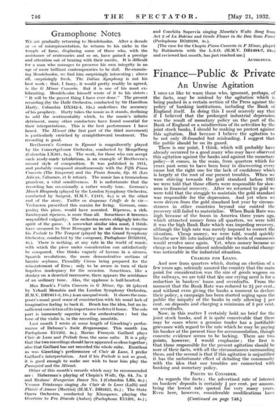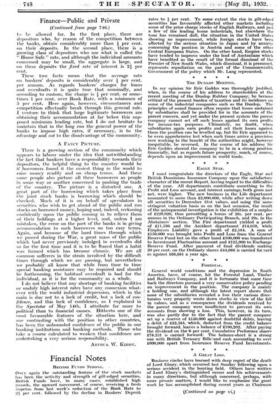Finance—Public & Private
An Unwise Agitation
I SHOULD like td warn those who, ignorant, perhaps, of the facts, may be mislead by the agitation which is being pushed in a certain section of the Press against the policy of banking institutions, including the Bank of England itself. In doing this I need scarcely say that if I believed that the prolonged industrial depression was the result of monetary policy on the part of the Bank of England or a misdirection of its activities by the joint stock banks, I should be making no protest against this agitation. But because I believe the agitation to be not only ill-founded but misleading, I suggest that the public should be on its guard. There is one point, I think, which will probably have already occurred to a good many who may have observed this agitation against the banks and against the monetary policy—it comes, in the main, from quarters which for years past seem to have been busy in discovering every cause but the right one for the lack of confidence which is largely at the root of our present troubles. When we were striving towards the gold standard before 1925 we were told that those efforts were responsible for slow- ness in financial recovery. After we returned to gold we were told that the struggle to maintain the gold standard was responsible for the depression. And yet when we were driven from the gold standard last year by circum- stances in other countries beyond our control the recovery still failed to materialize. When Bank Rate was high because of the boom in America three years ago, which attracted money from all quarters, we were told it was the high Bank Rate which was impeding recovery, although the high rate was merely imposed to correct the situation. Cheap money, we were told, would quickly breathe new life into industry and the wheels of commerce would revolve once again. Yet, when money became &o cheap as to become almost unlendable no material change was noticeable in the industrial situation.
CHARGES FOR LOANS.
And now from quarters which, during an election of a few years ago, solemnly assured the country that the main point for consideration was the size of goods wagons on the railways, we are told that the one crying need is for a reduction in bankers' loans and overdrafts. From the moment that the Bank Rate was reduced to 24 per cent, and without even giving the banks a moment to declare their policy, a campaign has been started urging upon the public the iniquity of the banks in only allowing 4 per cent. on deposits and charging a minimum of 5 per cent. on overdrafts.
Now, in this matter I certainly hold no brief for the joint stock banks, and it is quite conceivable that there may be cases where a genuine trader has a justifiable grievance with regard to the rate which he may be paying his banker at the present time for accommodation, though concrete evidence seems to be lacking. There are two points, however, I would emphasize ; the first is that those responsible for the present agitation should be sure of their facts, with all the circumstances surrounding them, and the second is that if this agitation is unjustified it has the unfortunate effect of deluding the community with the idea that our troubles are connected with banking and monetary policy.
POD.:TS TO CONSIDER.
As regards the facts ; the advertised rate of interest on bankers' deposits is certainly per cent. per annum, being the lowest rate quoted for very many years. Even here, however, considerable modifications have (Continued on page 748.) Finance—Public and Private
(Continued front page 746.)
to be allowed for. In the first place, there are depositors who,, by reason of the competition between the banks, obtain considerably more than per cent. on their deposits. In the second place, there is a growing class of depositors who use what is called the Home Safe: rate, and although the individual amounts concerned may be small, the aggregate is large, and on these deposits the fixed rate of interest is 21- per cent.
These two facts mean that the average rate
on bankers' deposits is considerably over per cent. per annum. As regards bankers' charges for loans and overdrafts it is quite true that nominally, and according to custom, the charge is per cent. or some- times 1 per cent. over Bank Rate, with a minimum of S per cent. 'Here again, however, circumstances and competition effectually break through this general rule. I venture to think that large legitimate borrowers are obtaining their accommodation at far below this sup- posed minimum lending rate, but I do not hesitate to maintain that in the long run the general power of the banks to impose high rates, if necessary, is to the advantage and not to the disadvantage of the community.
A FANCY PICTURE.
There is a growing section of the community which appears to labour under the idea that notwithstanding the fact that bankers have a responsibility towardS then depositors, the helpful thing to the country would be if borrowers found it the easiest thing in the world to raise money readily and on cheap terms. And these same people also picture all these borrowers as people in some way or another concerned in pushing the trade of the country. The picture is a distorted one. A great part of the borrowing which takes place from the joint stock banks is borrowing which should be checked. Much of it is on behalf of speculators in securities who wish to get ahead of the public and run stocks on borrowed money, hoping and, indeed, reckoning confidently upon the public coming in to relieve them of their holdings at a higher level, and, unless I am Mistaken, the error on the part of the banks is in giving accommodation to such borrowers on too easy terms. Again, and because of the hard times through which we passed during the War, a great mass of the public winch had never previously indulged in overdrafts did so for the first time and it is to be feared that a habit was formed which has become chronic. We are all common sufferers in the strain involved by the difficult times through which we are passing, but nevertheless we probably all know that while .from time to time special banking assistance may be required and should be forthcoming, the habitual overdraft is bad for the individual, as it is for the community as a whole.
I do not believe that any shortage of banking facilities or unduly high interest rates have any connexion .what- ever with the world industrial depression, which in the main is due not to a lack of credit, but a lack of con- fidence, and this lack of confidence, as I explained iin the Spectator of May 14th, I attribute far more to political. than to financial causes. Hitherto one of the most favourable features of the situation here, and one contrasting with the position in other countries, has been the unbounded confidence of the public in our banking-institutions and banking methodS. Those who take a course calculated to weaken that confidence are
undertaking a very serious responsibility. • ARTHUR- W. KIIMV.





































 Previous page
Previous page